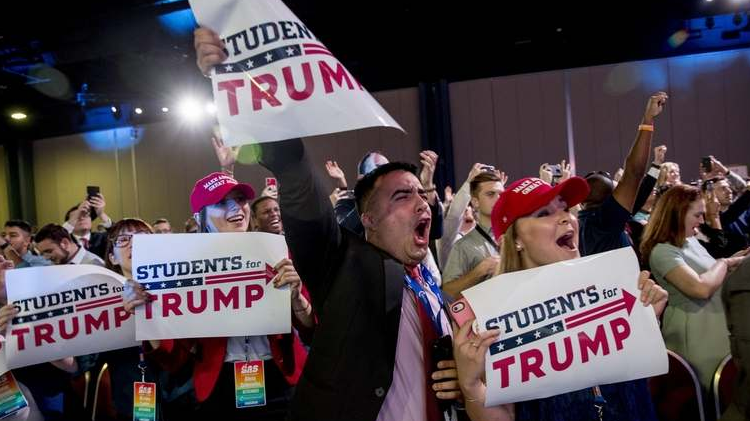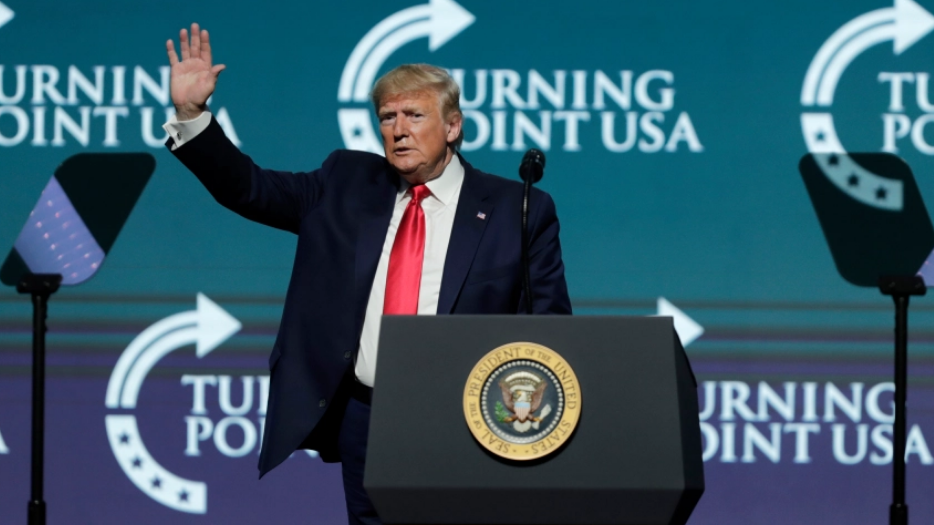
Members of the audience cheer as President Donald Trump speaks at the Turning Point USA Student Action Summit at the Palm Beach County Convention Center, West Palm Beach, Florida, December 21, 2019. /AP
Members of the audience cheer as President Donald Trump speaks at the Turning Point USA Student Action Summit at the Palm Beach County Convention Center, West Palm Beach, Florida, December 21, 2019. /AP
Editor's note: Andrew Korybko is a Moscow-based American political analyst. The article reflects the author's opinion, and not necessarily the views of CGTN.
The Washington Post ran an investigative report allegedly proving that Turning Point Action, an affiliate of the pro-Trump Turning Point USA, paid teenagers to post pro-Trump narratives on social media. The outlet even compared this to the purported "troll farms" that Russia was accused of running during the 2016 election through the Internet Research Agency. In response, Facebook and Twitter are cited in the report as having removed some of the accounts in question on the basis of their "coordinated activity."
This report raises some important ethical questions, the first of which relates to paying teenagers for political activity. They're too young to even vote, so critics might claim that it's misleading to use them to spread narratives that could potentially influence the outcome of the upcoming election. The second ethical question is about whether anyone should be paid at all to post political content on social media. And thirdly, in those cases where one's being paid for such activities, it's questionable whether narratives should be coordinated.
The Democrats and their supporters are probably strongly against this new reported Republican electioneering tactic even though it can't be ruled out that they themselves don't do the same. No similar reports have yet emerged accusing them of this, but it's difficult to believe that they would pass up this opportunity considering how cost-effective it is. Teenagers generally seem to be more supportive of Democrat narratives as it is, so there would presumably be an even larger pool of potential recruits for them to employ too.
In any case, there arguably isn't anything wrong with Turning Point Action's reported activities if they really did what's alleged. It makes sense to transition political canvassing to the online sphere in response to the COVID-19 pandemic making traditional face-to-face interactions at people's homes practically impossible. In fact, such online activism precedes the pandemic by at least two decades, with people taking to forums before the advent of social media to share support for their preferred political candidates.

U.S. President Donald Trump waves after giving a speech at the Turning Point USA Student Action Summit at the Palm Beach County Convention Center, West Palm Beach, Florida, December 21, 2019. /AP
U.S. President Donald Trump waves after giving a speech at the Turning Point USA Student Action Summit at the Palm Beach County Convention Center, West Palm Beach, Florida, December 21, 2019. /AP
Hiring teenagers also isn't unethical since many youth want summer jobs and/or internships, not just for the experience that they provide, but also as a resume booster when applying to college.
They aren't being forced to parrot pro-Trump talking points but presumably already agree with them as it is and have probably already been sharing them for free before this. The same principle applies regardless of political disposition in the event that the Democrats are found to have employed this tactic as well. It's reasonable to hire one's supporters.
On the topic of whether this is ethical since teenagers can't vote, the argument can be made that all Americans have the right to responsibly express their freedom of speech about whatever it is that they so choose so long as they're not advocating for anything that's criminal.
Nobody is forcing anyone to read, agree, or engage with those posts, the same as nobody forces anyone else to open their door for an in-person political canvasser who appears at their homes. Digital activism is therefore less intrusive and more convenient for both sides.
Some might take issue with the "coordinated activity" that Turning Point Activism was reportedly involved in, but that in and of itself isn't anything new for political campaigns and their canvassers, both those that carry out their activities face-to-face and online. Acting as if everyone who's ever been directly or indirectly employed in support of a political campaign is operating in complete autonomy without interacting with their boss or anyone else who supports the same views is unrealistic since that's not how it happens in reality.
What's unethical about this story then is that Facebook and Twitter removed some of the accounts that were accused of carrying out "coordinated activity."
This is a blatant double standard that was implementing for either partisan reasons related to Big Tech's general support of the Democrats or for face-saving reasons in response to the Washington Post's inquiry and the likely Democrats-led pressure campaign that would have followed. All in all, there's nothing wrong with teenagers getting paid to share their political opinion online.
(If you want to contribute and have specific expertise, please contact us at opinions@cgtn.com.)